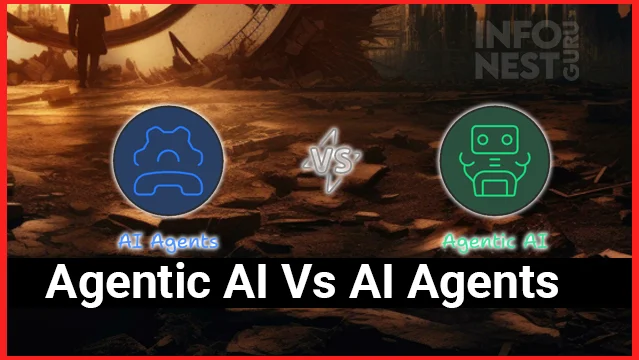 |
| Agentic AI vs. AI Agents: The Truth You Must Know |
What is Agentic AI?
Agentic AI refers to artificial intelligence
systems that exhibit a high degree of autonomy, decision-making capabilities,
and proactive behavior. Unlike traditional AI, which operates based on
predefined rules or reactive responses, Agentic AI is designed to take
initiative, learn from its environment, and act independently to achieve
specific goals.
Think of Agentic AI as a self-driving car
that doesn’t just follow a set route but adapts to traffic conditions, weather,
and even unexpected obstacles in real-time. It’s not just reactive—it’s
proactive, making decisions that align with its objectives without constant
human intervention.
Key Features of Agentic AI:
Autonomy: Operates independently with minimal
human oversight.
Proactiveness: Takes initiative to achieve
goals.
Adaptability: Learns and evolves based on
environmental feedback.
Goal-Oriented: Focused on achieving specific
outcomes.
What are AI Agents?
AI Agents, on the other hand, are software
programs or systems designed to perform specific tasks on behalf of users.
These agents can range from simple chatbots to complex virtual assistants like
Siri or Alexa. Unlike Agentic AI, AI Agents typically operate within a defined
scope and rely on human input or pre-programmed instructions to function. For example, a customer service chatbot is an
AI Agent that answers queries based on a predefined knowledge base. It doesn’t
make decisions on its own but follows a set of rules to provide accurate
responses.
Key Features of AI Agents:
Task-Specific: Designed for particular
functions or roles.
Reactive: Responds to user inputs or
triggers.
Rule-Based: Operates within predefined
parameters.
Human-Dependent: Requires human input or
oversight to function effectively.
Agentic AI vs. AI Agents: The Key Differences
While both Agentic AI and AI Agents fall
under the umbrella of artificial intelligence, their core differences lie in
their level of autonomy, decision-making capabilities, and scope of
operation.
|
Aspect |
Agentic
AI |
AI
Agents |
|
Autonomy |
Highly
autonomous, operates independently |
Operates
within predefined rules and requires human input |
|
Decision-Making |
Proactive,
makes decisions to achieve goals |
Reactive,
follows instructions or rules |
|
Scope |
Broad,
adaptable to various environments |
Narrow,
task-specific |
|
Learning |
Learns
and evolves over time |
Limited
learning capabilities |
Understanding the difference between Agentic
AI and AI Agents is crucial for businesses, developers, and consumers alike.
Here’s why:
1. For
Businesses:
Agentic AI can revolutionize industries by
enabling autonomous systems that optimize operations, reduce costs, and improve
efficiency.
AI Agents, on the other hand, are ideal for
automating repetitive tasks and enhancing customer experiences.
2. For
Developers:
Building Agentic AI requires advanced
algorithms, machine learning models, and ethical considerations to ensure safe
and responsible autonomy.
Developing AI Agents involves creating
user-friendly interfaces and integrating them seamlessly into existing
workflows.
3. For
Consumers:
Agentic
AI promises smarter, more intuitive technologies that can anticipate needs and
provide personalized solutions.
AI Agents offer convenience and efficiency in
everyday tasks, from scheduling appointments to managing smart home
devices.
The Future of Agentic AI and AI Agents
As AI continues to advance, the line between
Agentic AI and AI Agents may blur. However, their unique strengths will ensure
they coexist and complement each other in the tech ecosystem.
Agentic
AI will drive innovation in fields like
healthcare, logistics, and autonomous vehicles, where independent
decision-making is critical.
AI
Agents will remain essential for enhancing user
experiences, streamlining workflows, and providing reliable support in various
applications.
Final Thoughts
The distinction between Agentic AI and AI
Agents is more than just semantics—it’s about understanding the capabilities
and limitations of each. Whether you’re a tech enthusiast, a business leader,
or a curious consumer, staying informed about these advancements will help you
navigate the AI-driven future with confidence.
As we embrace these technologies, it’s
essential to prioritize ethical considerations, transparency, and
accountability to ensure they benefit society as a whole.
By understanding the nuances of Agentic AI
and AI Agents, you’re better equipped to harness their potential and stay ahead
in the AI revolution.
References:
1. Russell, S., & Norvig, P. (2020). Artificial
Intelligence: A Modern Approach. Pearson.
2. Goodfellow, I., Bengio, Y., &
Courville, A. (2016). Deep Learning. MIT Press.
3. LeCun, Y., Bengio, Y., & Hinton, G.
(2015). Deep Learning. Nature, 521(7553), 436-444.





0 Comments